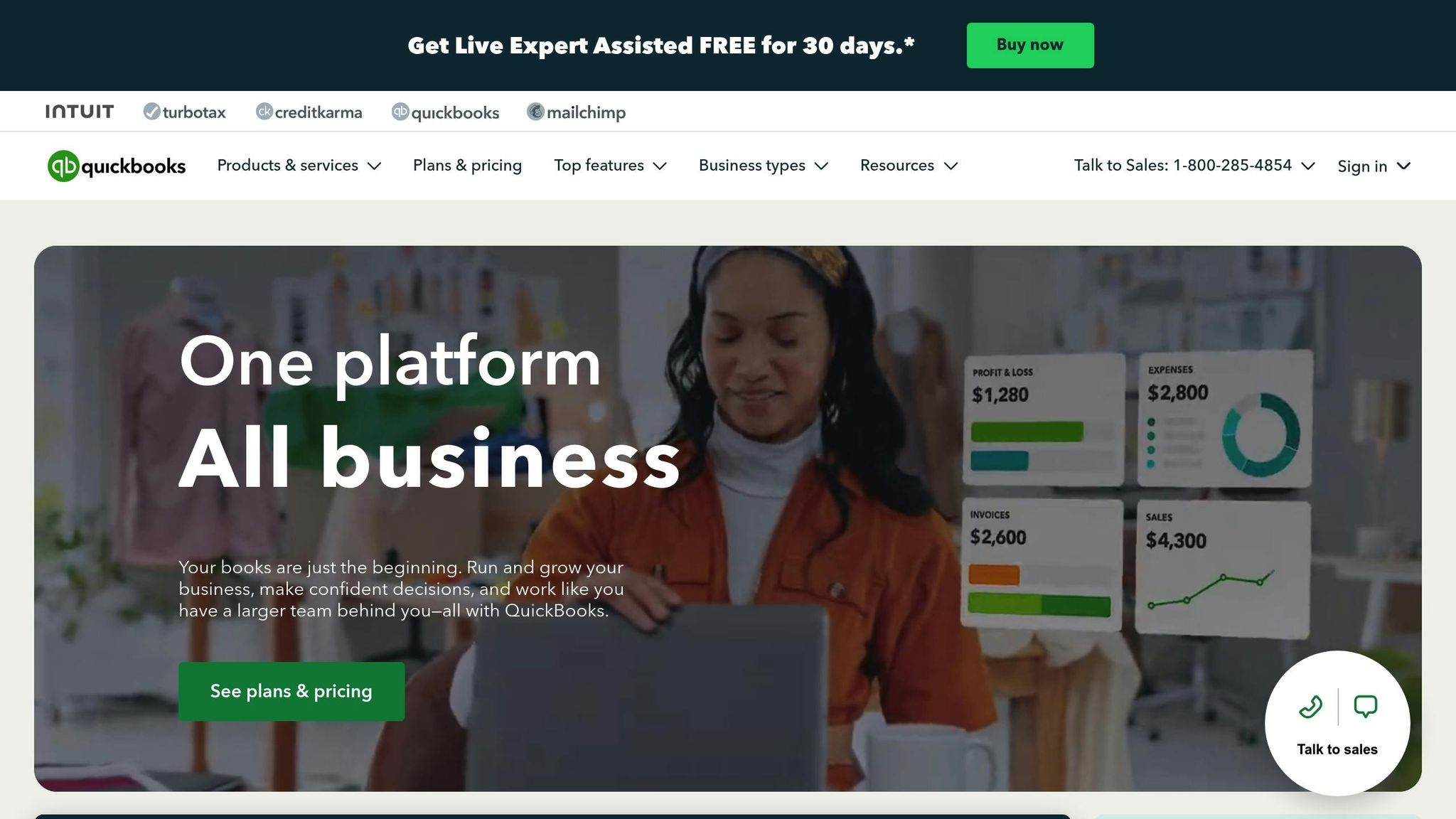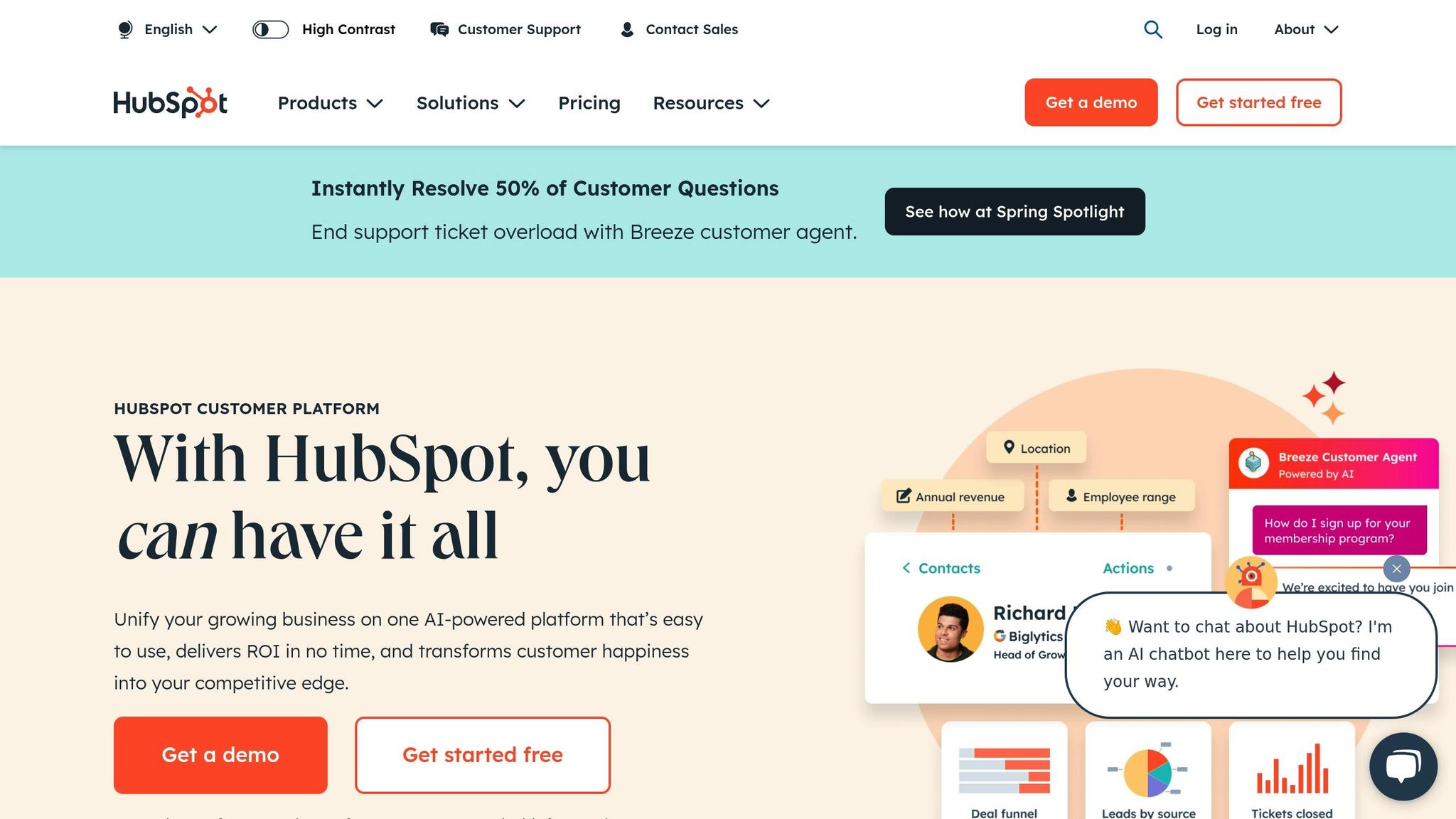AI tools can help small businesses save time, improve efficiency, and boost productivity. Here are three standout tools and what they can do for your business:
- ChatGPT: Automates customer support, creates content, and provides insights from data.
- QuickBooks: Simplifies accounting with features like automated invoices, cash flow forecasting, and tax management.
- HubSpot: Enhances customer relationships with AI-powered CRM, marketing automation, and data-driven reporting.
Quick Comparison
| Tool | Main Use | Key Features | Starting Price |
|---|---|---|---|
| ChatGPT | Customer support, content | Chatbots, content creation, analytics | Free, GPT-4 at $20/month |
| QuickBooks | Financial management | Invoicing, cash flow, tax automation | Pricing varies |
| HubSpot | CRM and marketing | Email automation, chatbot, reporting | Free, paid plans from $50/month |
Pro Tip: Start with the free versions to explore features, then upgrade based on your business needs. These tools are great for saving time on repetitive tasks and focusing on growth.
Best AI Tools for Small Businesses in 2025
1. ChatGPT Features & Uses
ChatGPT leverages advanced NLP technology to help small businesses streamline their operations. It can handle a variety of tasks, making it a valuable tool for entrepreneurs juggling multiple responsibilities.
| Business Function | Key Applications | Advantages |
|---|---|---|
| Customer Support | Chatbot responses, ticket sorting | Faster replies, consistent service |
| Content Creation | Articles, social posts | Saves time on content production |
| Business Analysis | Feedback analysis, data insights | Better decision-making |
Here are three key ways small businesses can use ChatGPT:
- Improving Customer Service
ChatGPT provides round-the-clock customer support. It can analyze customer inquiries, categorize support tickets, and deliver instant answers to frequently asked questions.
- Speeding Up Content Creation
ChatGPT significantly reduces the time needed for content creation (usually 2–6 hours per piece). It can assist with:
- Drafting blog posts and articles
- Writing social media updates
- Creating presentations
- Composing professional emails
- Boosting Operational Efficiency
The platform can process customer feedback and summarize data into actionable insights.
"The greatest development that will allow small businesses and entrepreneurs to compete with large corporations has become available - for free." - Nicholas Leighton, Entrepreneur Leadership Network® Contributor
To maximize its potential, use clear prompts and refine responses based on feedback. For those relying heavily on the tool, the GPT-4 subscription offers faster replies and priority support.
Pro Tip: Start with the free version to explore its capabilities. Once you identify specific needs that require advanced features, consider upgrading to GPT-4.
Next, we’ll dive into QuickBooks and how it simplifies financial management.
2. QuickBooks Analysis

QuickBooks, powered by Intuit Assist, simplifies small business accounting with AI-driven tools.
Key Financial Functions
| Financial Task | AI Capability | Business Impact |
|---|---|---|
| Invoice Management | Automated reminders and tracking | Payments processed 45% faster |
| Cash Flow | Predictive forecasting | Improved financial planning |
| Tax Management | Automated deduction identification | Less time spent on accounting |
| Payroll Processing | Automated calculations | Smoother operations |
According to data from U.S. Intuit Assist Beta customers (January–August 2024), businesses using AI-generated invoice reminders saw payments arrive 45% faster than those relying on standard reminders. This highlights how QuickBooks optimizes financial workflows.
AI-Powered Tools That Make a Difference
-
Workflow Automation
- Automatically generate and track invoices
- Categorize expenses without manual input
- Predict cash flow trends with accuracy
-
Smart Finance Management
- Identify tax deductions effortlessly
- Automate payroll tasks
- Access real-time financial updates
By automating repetitive tasks, QuickBooks helps business owners dedicate more time to strategic growth.
Pro Tip: Start with automated invoice reminders to see immediate improvements in cash flow - data shows this feature delivers quick results.
sbb-itb-212c9ea
3. HubSpot Capabilities

Building on QuickBooks' approach to efficient financial management, HubSpot focuses on improving customer engagement and streamlining marketing for small businesses.
HubSpot's AI-powered CRM simplifies customer relationship management and automates marketing tasks. Its built-in AI tools provide measurable benefits across various business areas.
AI-Driven Performance Metrics
| Business Function | AI Impact | Success Rate |
|---|---|---|
| Customer Service | Faster ticket response | 84% improvement |
| Marketing Content | Higher quality output | 90% effectiveness |
| Sales Prospecting | Improved engagement | 86% success rate |
| Customer Relations | Faster relationship building | 72% faster |
Smart Marketing Automation
HubSpot's Marketing Hub, powered by its Breeze technology, reshapes how small businesses attract and engage customers. This platform includes AI tools for creating content, managing social media, and tracking customer interactions.
Key AI Features:
- Automated content creation for blogs and social media
- Website optimization using a web builder assistant
- Personalized email automation
- 24/7 AI chatbot support
- Data-driven reporting tools
These AI tools not only improve marketing efficiency but also help businesses grow without overspending.
Real-World Example
The success story of Appareify highlights how adopting AI can revolutionize customer service. With AI tools, they improved ticket prioritization and delivered faster, more effective customer support.
Flexible Pricing Options
HubSpot offers pricing plans designed for small businesses. Basic CRM features are free, while advanced AI tools are available in paid plans starting at $50 per month.
Pro Tip: Start with the email content assistant to test HubSpot's AI capabilities before expanding to other tools. This ensures you maintain brand consistency while exploring AI's potential.
Making the Most of HubSpot
To get the best results from HubSpot's AI tools, small businesses should focus on strategies that align with their brand and goals. Key practices include:
- Keeping AI-generated content aligned with your brand voice
- Regularly updating content with accurate, current information
- Personalizing automated messages
- Targeting prospects effectively
- Monitoring AI-driven campaigns and adjusting based on performance
Tool Comparison
Now that we've looked at each tool individually, let's see how they stack up for small business needs.
Core Features Comparison
| Feature Category | ChatGPT | QuickBooks | HubSpot |
|---|---|---|---|
| Primary Function | Generates text for FAQs and customer support | Handles financial management and accounting | Manages customer relationships (CRM) |
| Key Capabilities | Text generation, FAQ automation | Automates accounting tasks and financial reports | Automates CRM tasks, supports content personalization |
Cost-Benefit Analysis
| Tool | Pricing | Key Benefits |
|---|---|---|
| ChatGPT | Free basic version; API pricing varies | Cuts down on the need for 24/7 live support |
| QuickBooks | Pricing upon request | Simplifies accounting, reduces manual work |
| HubSpot | Free CRM; paid plans from $50/month | Improves efficiency in managing customer relationships |
Try the free versions first to see which tool fits your business needs best. These comparisons show how each tool can address specific challenges faced by small businesses.
Recommendations
Based on our analysis, these suggestions highlight how AI tools can improve different aspects of your business. Tools like ChatGPT, QuickBooks, and HubSpot address specific challenges faced by small businesses.
For Customer Support Operations
ChatGPT can handle customer inquiries around the clock. To make the most of it:
- Train it using your company’s FAQ documents.
- Set up automated replies for common questions.
- Use it to draft responses for more complex support tickets, saving your team time.
For Financial Management
Once customer support is running smoothly, focus on improving financial processes with QuickBooks. This tool can automate bookkeeping, create financial reports, and track expenses and revenue in real time. According to research, 95% of professionals say AI tools help them spend less time on manual tasks.
For Marketing and Sales
Take your marketing and sales efforts to the next level with HubSpot. Its AI-powered tools help personalize content, manage customer relationships, and create a unified marketing strategy. In fact, 86% of sales professionals believe generative AI is effective for writing prospecting messages.
Implementation Best Practices
To successfully integrate these tools:
- Start with free versions to explore features before committing to paid plans. Allow your team a few weeks to adjust.
- Ensure data security by reviewing the tool's data policies before implementation.
- Set clear, measurable goals to evaluate the return on investment.
Research shows that 72% of business leaders report increased productivity after adopting AI tools. These tools aren’t just expenses - they’re investments in your business’s future growth.



